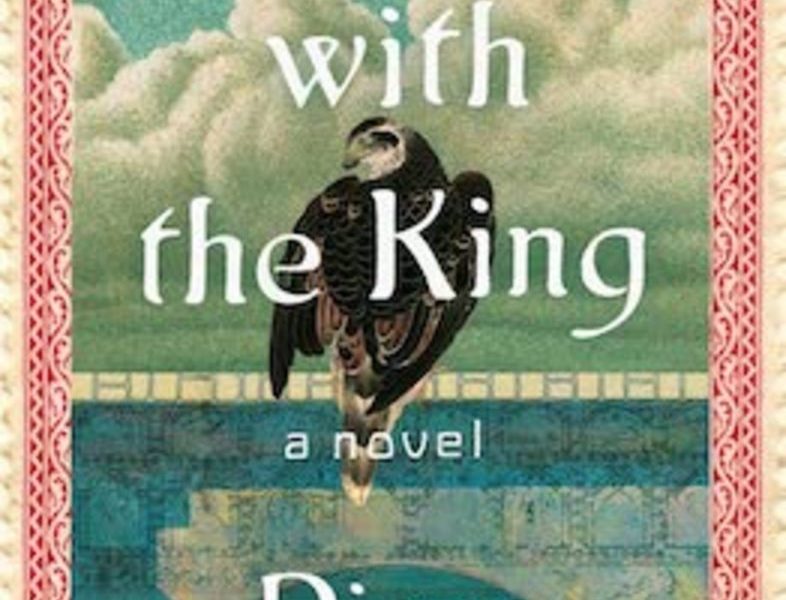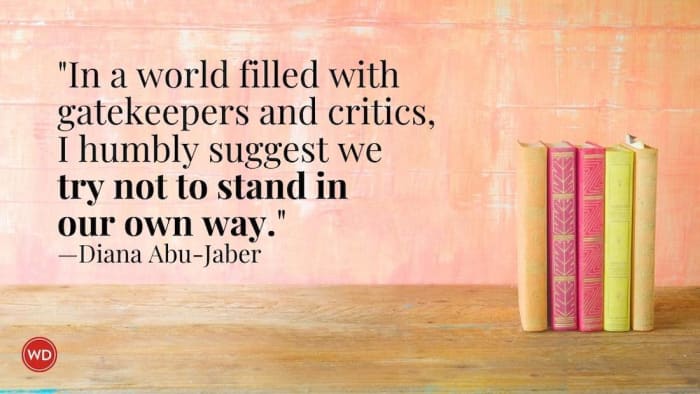4 Tips on How To Begin a Novel
You’ve got an idea for a novel, I know you do. Maybe you talk about it all the time, maybe you just silently obsess over it, afraid to spoil the beautiful notion by writing it down. I understand—I’ve done the same thing myself.
(Diana Abu-Jaber: On Unearthing Family History)
Maybe some ideas are just too pretty to be written. But in a world filled with gatekeepers and critics, I humbly suggest we try not to stand in our own way. Here are some pointers to help you move from dreaming to writing.
1. Mise En Place
Cooks know there’s something called a mise en place: You read the recipe, if there is one, and assemble your tools and ingredients. It’s another way of saying that the cooking begins before you begin cooking.
The same thing is true for writing. The writer’s mise en place is in fact a place. Do you have a place where you can think, where you can dream and explore? A private office is wonderful, but it isn’t essential. I’ve written several books on various dining room tables.
There needs only to be a tacit understanding that this is your creative retreat. It should be your “creation space,” so when you go to that special table or corner or armchair, your body knows, even before your mind does, that you’re about to write.
Your tools might also include a certain pen or notebook: I write all my first drafts by hand. Crazy, I know! If you’ve done research or free-writing or journaling, these ingredients should all be within reach, ready to go into your novel.
Your writer’s mise en place will help you settle into your creative mind, reduce outside distractions, and signal to your subconscious that you’re about to begin. Instead of avoiding all the heavy thinking and struggling that you might be putting off, you can let the physical world gently lead you into the story.
2. Make The Marble
Michelangelo reputedly said, “I saw the angel in the marble and carved until I set him free.” Writers must free their angels as well. But first you need the marble. The marble in this case is all the primary material that will come to form the basis of your novel. For many of us, that involves research.
What do I mean by research? It depends on the demands of your story. You may need to access old archives, photographs and books. Sometimes it’s essential to interview your subjects. Not all your research will make it into your novel. You need to bring together all sorts of raw materials and from these you can liberate your story.
Research is wonderful because it can be an inspiring starting point. You may find that it leads you to fascinating new questions. When I started writing Fencing with the King, I thought it was going to be about someone training for a duel. But as I learned about fencing and weaponry, I realized that I wanted to write about the old knife I inherited from my father.
IndieBound | Bookshop | Amazon
[WD uses affiliate links.]
Then I started thinking about inheritance and the law. One point of study led to another. This process took me to unexpected plot lines and character motivation. That experience of following curiosity and uncovering fresh elements translates to the page. It’s exciting and inspiring and will bring you that much faster into your story.
That said, you have to make sure that you don’t allow research to become its own stumbling block. All things in moderation. One well-known writer told an audience that she researched her novel for 10 years: Sometimes “research” can be another word for avoidance.
3. Strategize
Make a writing plan and stick to it. Do this at the beginning of the day, every day. If you know you love to research, place limits on yourself. When I began work on Fencing With the King, I allowed myself a 50/50 ratio—to spend at least as much time writing as I did researching.
So if I had an hour to lavish on my novel, then I could spend 30 minutes of it researching and the rest went to writing the rough draft. The point is to stay engaged in both aspects of the writing process—making marble and sculpting it.
Which leads me to an important point: Beware the internet. Google is amazing for getting started on your research and for answering simple questions. But it can sneak up on you—the Google rabbit hole can be deep and time-sucking.
I’ll disconnect my computer from WiFi for a period of time—anywhere from 30 minutes to several hours—and use it strictly as a word processor. Often, I’ll forget I’m disconnected and catch myself trying to “hop back” to look something up or check social media. It’s important to recognize how easily and almost invisibly the internet can soak up our time if we don’t take control of it.
4. Start Small
E.L. Doctorow said, “Writing a novel is like driving a car at night. You can only see as far as your headlights, but you can make the whole trip that way.” In other words, you don’t try to write the thing in a few massive sessions, you do it in small, manageable pieces.
People have all sorts of inventive methods for breaking down their novels and plot structures, like using index cards to create a storyboard, or writing short stories that can be turned into chapters. Personally, I always like to have an outline in place to help me get started. It doesn’t have to be a big, elaborate thing. James Elroy told me his outlines were around 300 pages long—I replied that those were also known as first drafts.
Once I have an idea of what I want to write about, I try to divide it into its component pieces. For Fencing with the King, I listed my main players and wrote a bit of backstory for each. I thought about what motivated them, what their goals were, and what their big obstacles would be. In the case of my novel, my main character Amani wants to learn about the mystery of her father’s past. She’s motivated not merely by curiosity, but also by a sense of having gone astray in her own life. And one of her biggest obstacles comes in the form of a difficult uncle with his own dark secrets.
These details were just a bare sketch but they were enough to get me started. You can add to your outline as you go. I often rewrite my outlines as the novel takes shape. Outlines tell writers that there is a shape and direction to their work and remind us to finish what we start. They give writers a light to follow on that long journey into the night.




